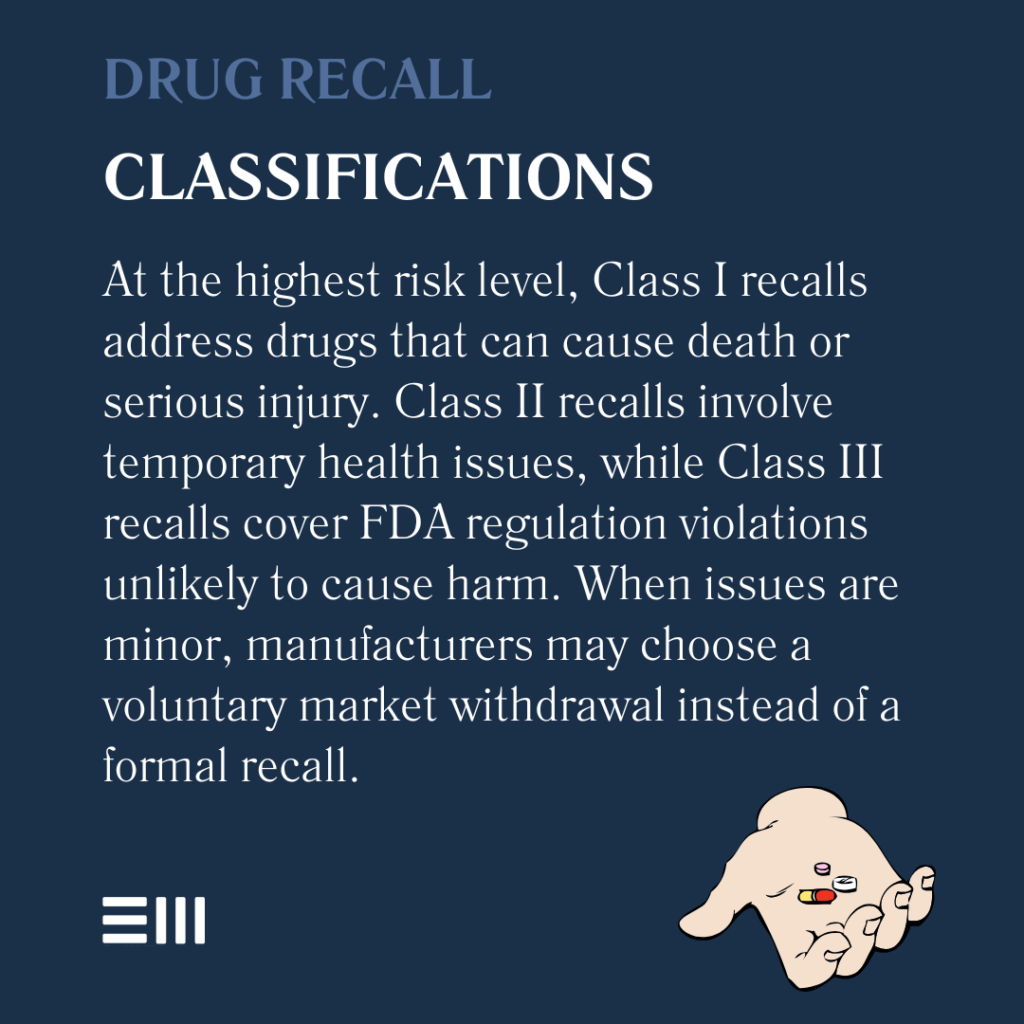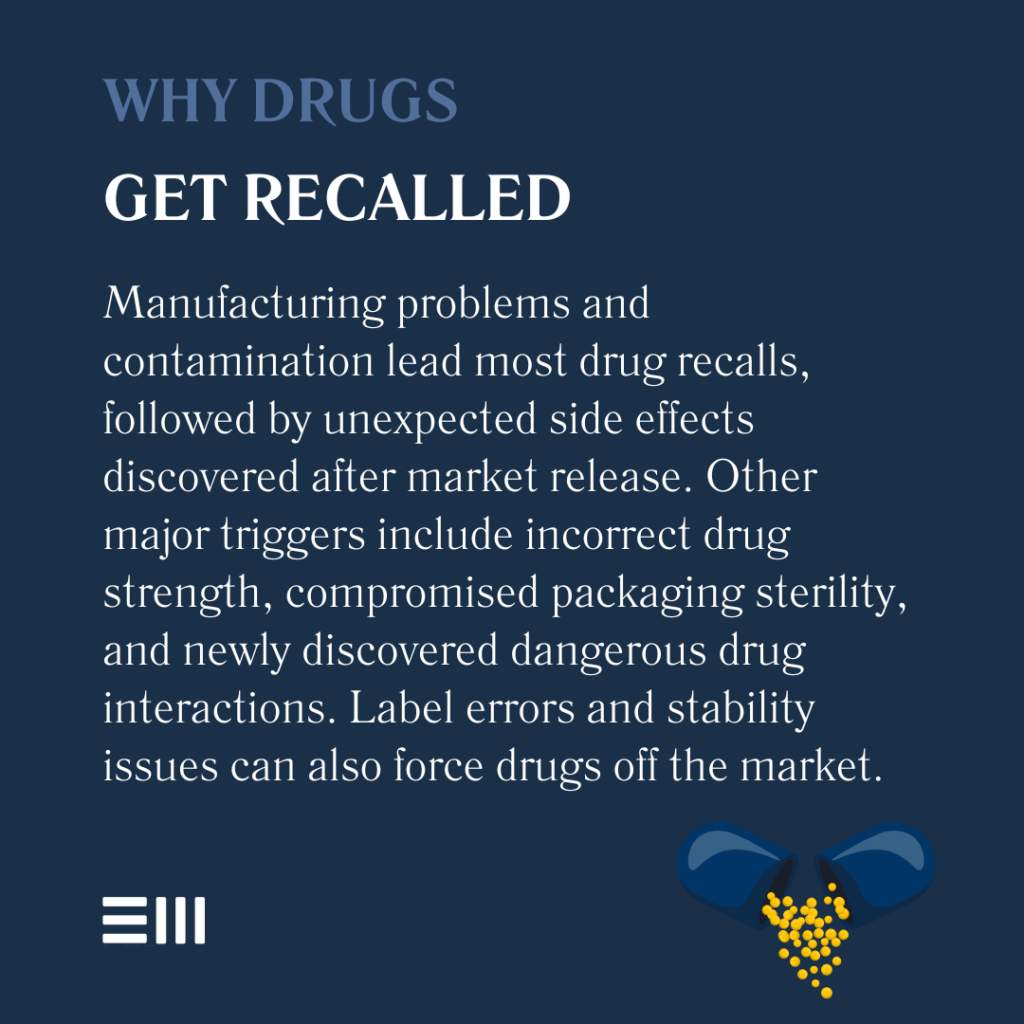
Over 1.3 million Americans suffered serious injuries from FDA-approved prescription medications in the past decade alone.
Every morning, millions of Americans reach for prescription medications, trusting these drugs to improve their health and quality of life.
Yet, for many families across Alabama, this simple act of trust has led to devastating consequences.
Behind the complex medical terminology and pharmaceutical patents lie real stories of parents, children, and loved ones whose lives changed dramatically after taking medications they believed were safe.
From blood thinners that caused uncontrollable bleeding to diabetes medications linked to cancer, these dangerous drugs transform routine treatment into life-altering ordeals.
Understanding Drug Recalls and Pharmaceutical Litigation
When the FDA orders a drug recall, it represents the final step in a long chain of evidence showing a medication’s potential for serious harm.
Pharmaceutical companies have a legal obligation to ensure their products are safe and effective, yet countless medications have been pulled from market shelves after causing severe injuries or deaths.
The complexity of modern drug development, combined with pressure to bring new medications to market quickly, has led to an increasing number of recalls in recent years.
Types of Drug Recalls
Each level of drug recall represents a different degree of danger to public health. Understanding these classifications helps patients assess their risk level and determine appropriate legal actions.
- Class I Recalls: Products that can cause serious health problems or death.
- Class II Recalls: Products that may cause temporary health problems.
- Class III Recalls: Products that violate FDA regulations but are unlikely to cause health problems.
- Market Withdrawal: Manufacturer voluntarily removes products with minor violations.
The severity of the recall classification often correlates directly with the strength of potential legal claims and the urgency of seeking legal counsel.

Common Reasons for Drug Recalls
Drug recalls occur for various critical reasons that can impact patient safety and legal liability:
- Contamination during manufacturing;
- Unsafe drug interactions discovered after market release;
- Improper labeling or packaging;
- New side effects identified through post-market surveillance;
- Incorrect potency or composition;
- Manufacturing defects;
- Stability issues affecting drug efficacy;
- Packaging defects that compromise sterility;
- Discovery of carcinogenic ingredients; and
- Cross-contamination with other medications.
These issues often emerge only after thousands of patients have already been affected, leading to widespread health impacts and complex legal scenarios.

Legal Rights of Affected Patients
Those harmed by dangerous drugs have specific legal protections under both federal and Alabama state law.
These protections extend beyond simple product liability to encompass various forms of negligence and failure to warn.
Understanding these rights is crucial for patients seeking justice and compensation for their injuries.
Legal Theories in Pharmaceutical Cases
Several legal principles may apply in dangerous drug cases:
- Strict liability for defective products;
- Negligence in manufacturing or testing;
- Failure to warn about known risks;
- Breach of implied warranty;
- Fraudulent misrepresentation;
- Design defects;
- Manufacturing defects; and
- Marketing defects.
Each theory requires different evidence and legal strategies to prove liability.
Available Legal Options
Patients affected by dangerous drugs can pursue several legal pathways, each with its own advantages and considerations:
- Individual lawsuits against pharmaceutical companies;
- Class action lawsuits with other affected patients;
- Claims against prescribing healthcare providers;
- Compensation through established settlement funds;
- Administrative claims through regulatory agencies;
- Multi-district litigation participation;
- State-specific consumer protection claims; and
- Federal regulatory compliance actions.
The choice of legal strategy depends on factors like injury severity, evidence strength, and time constraints.
Statute of Limitations Considerations
Alabama law sets specific time limits for filing dangerous drug claims. Under Alabama Code § 6-2-38, most pharmaceutical injury claims must be filed within two years. These deadlines vary based on:
- Type of injury sustained;
- Date of discovery;
- Manufacturer’s knowledge of risks;
- Patient’s reasonable awareness of cause;
- Ongoing medical complications;
- New scientific evidence; and
- Related FDA actions.
Missing these deadlines can permanently bar recovery, making timely legal consultation essential.
Frequently Asked Questions About Dangerous Drug Claims in Alabama
Understanding pharmaceutical litigation can seem overwhelming.
Here are answers to common questions that arise during these cases.
How Long Do I Have to File a Dangerous Drug Claim in Alabama?
Under Alabama law, patients typically have two years from the date they discovered their injury to file a claim.
However, exceptions exist when injuries weren’t immediately apparent or when new evidence emerges about a drug’s dangers.
The discovery rule may extend this period in cases where the connection between the drug and injury wasn’t immediately clear.
What Compensation Can I Recover From a Pharmaceutical Lawsuit?
Successful claims may recover several types of damages:
- Medical expenses (past and future);
- Lost wages and earning capacity;
- Pain and suffering;
- Permanent disability costs;
- Emotional distress;
- Loss of quality of life;
- Future medical monitoring;
- Loss of consortium;
- Punitive damages in cases of gross negligence; and
- Wrongful death damages for fatal reactions.
Evidence of direct causation strengthens claims for these damages, and expert testimony often plays a crucial role in establishing their value.
How Can I Prove a Drug Caused My Injury?
Building a strong case requires several key elements that demonstrate causation and damages:
- Medical records showing drug usage;
- Documentation of injuries;
- Expert medical testimony;
- Evidence of proper usage;
- Proof of manufacturing defects;
- Scientific studies linking the drug to similar injuries;
- Pharmacy records and prescriptions;
- Timeline of symptoms and treatment;
- Expert analysis of drug safety data; and
- Documentation of FDA warnings and recalls.
Professional legal guidance helps gather and present this evidence effectively while building a compelling narrative of causation.
What Are Common Defense Strategies in Pharmaceutical Cases?
Understanding potential defenses helps strengthen your case:
- Alternative cause arguments;
- Failure to follow instructions;
- Pre-existing conditions;
- Statute of limitations;
- Assumption of risk;
- Learned intermediary doctrine;
- FDA compliance defense; and
- State-of-the-art defense.
Anticipating and countering these defenses requires experienced legal representation.
Taking Action: Your Next Steps
The path to justice starts with understanding your rights and options. Our experienced legal team specializes in pharmaceutical litigation and has helped countless Alabama residents secure the compensation they deserve.
Contact us today for a free, confidential consultation to discuss your case. Time limits apply to dangerous drug claims, so don’t wait to learn about your legal options.
Can't find what you're looking for? Search our site below.










